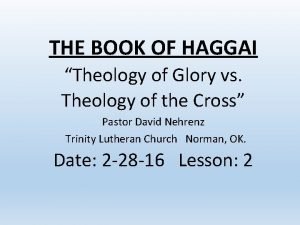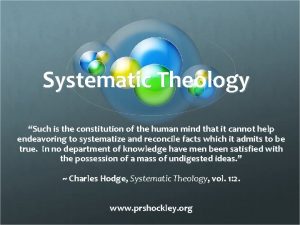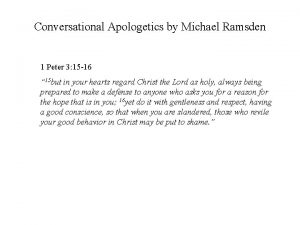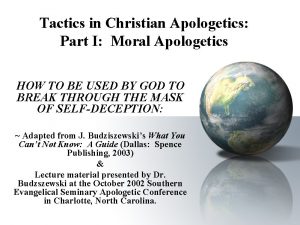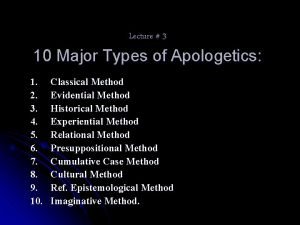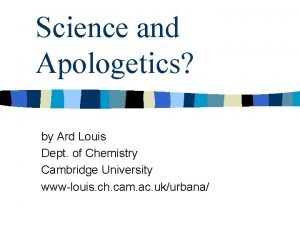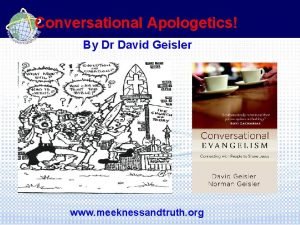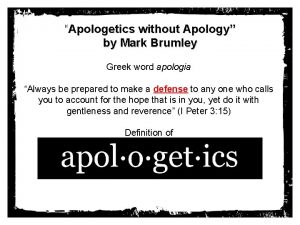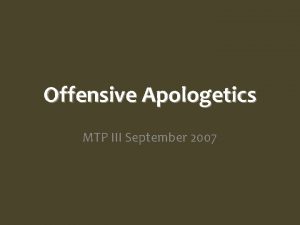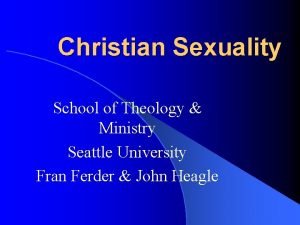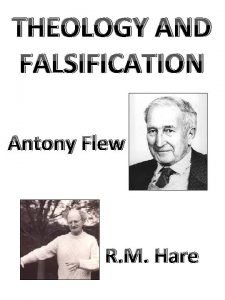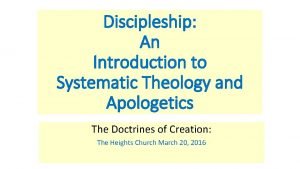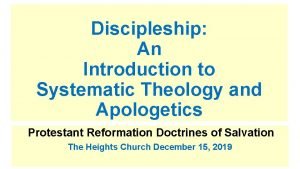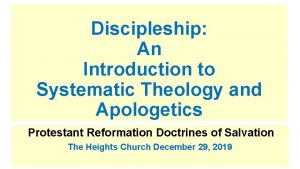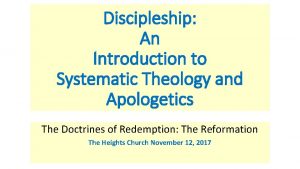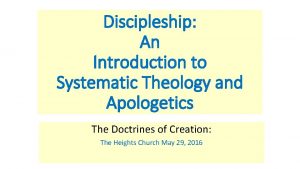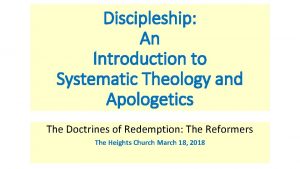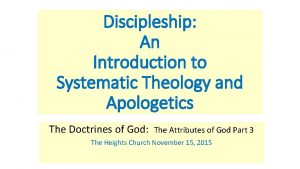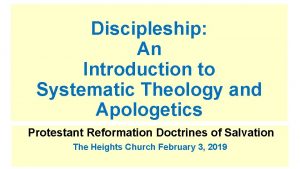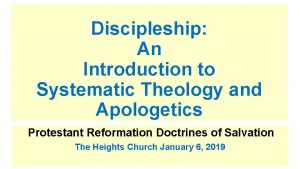Discipleship An Introduction to Systematic Theology and Apologetics











- Slides: 11

Discipleship: An Introduction to Systematic Theology and Apologetics The Doctrines of Redemption: The Reformation The Heights Church October 22, 2017

The Reformation – Augustine of Hippo (REVIEW) • Greatest Theologian between the Apostles and Aquinas. • Most influential theologian for Luther and Calvin. • Just as an external source of light is needed for seeing, so an external revelation from God is needed for knowing. ” Only a work of divine grace could incline the soul to God. • “I believe in order to understand. ” All knowledge (spiritual/doctrinal) begins in faith which is prior to reason. For Augustine faith is always reasonable. • Augustine held that "the timing of the work of grace was a mystery known only to God. • God had created ex nihilo (out of nothing) as a voluntary and purposive but unnecessary act. • Since God is good, everything God created is good including material things BUT he did not create things immutably good so the Fall could occur.

The Reformation – Augustine of Hippo (REVIEW) • Evil is a lack, privation or negation of the good. • In The City of God, he presents the development of slavery as a product of sin and contrary to God's divine plan and vigorously condemned abortion. • In his debate with Pelagius he established that Adam’s sin was inherited/imputed (counted as) by every human (except Jesus). The resulting doctrine of “original sin” defined the problem whose true solution would be revealed in the Reformation. but God shows his love for us in that while we were still sinners, Christ died for us. Since, therefore, we have now been justified by his blood, much more shall we be saved by him from the wrath of God. For if while we were enemies we were reconciled to God by the death of his Son, much more, now that we are reconciled, shall we be saved by his life. (Romans 5: 8 – 10) Therefore, just as sin came into the world through one man, and death through sin, and so death spread to all men because all sinned-- for sin indeed was in the world before the law was given, but sin is not counted where there is no law. Yet death reigned from Adam to Moses, even over those whose sinning was not like the transgression of Adam, who was a type of the one who was to come. (Romans 5: 12 – 14)

The Reformation – Augustine of Hippo’s Definition of Original (inherited) Sin Free Agency Humanity Fallen Modern Definition/Latin term created Humanity yes Ability to choose whatever is most pleasing to us. Free Will Able to sin Able to not sin Unable to not sin yes yes no no yes Ability to chose any available moral option. Posse peccare Posse non pecarre Non posse non peccare • To be “born again” means Posse non pecarre is restored. • The Western Church at the Second Council of Orange in 529 labeled as heresy a modified Pelagianism that the beginning of faith is an act of free will, with grace supervening only later by a work of God to increase faith. • Augustine said in his debate with Pelagius that the sin of pride consists in assuming that "we are the ones who choose God or that God chooses us because He foresees something worthy in us. ”

The Reformation – St Benedict (480 - March 21, 547) • Founder of the monastic movement that was responsible for most of what truly represented Philippians 4: 8 for a 1000 years. Finally, brothers, whatever is true, whatever is honorable, whatever is just, whatever is pure, whatever is lovely, whatever is commendable, if there is any excellence, if there is anything worthy of praise, think about these things. • Monasticism arose as a result of the legalization of Christianity. Now it was possible to be a Christianity professional and have respect, access to the powerful and a reasonably high standard of living.

The Reformation – St Benedict (480 - March 21, 547) • The Rule of St Benedict • Seventy-three short chapters comprise the Rule. • Its wisdom is of two kinds: spiritual (how to live a Christocentric life on earth) and administrative (how to run a monastery efficiently). • More than half the chapters describe how to be obedient and humble, and what to do when a member of the community is not. • About one-fourth regulate the work of God (the Opus Dei). • One-tenth outline how, and by whom, the monastery should be managed. • Following the golden rule of Ora et Labora - pray and work, the monks each day devoted eight hours to prayer, eight hours to sleep, and eight hours to manual work, sacred reading, or works of charity.

The Reformation – St Benedict (480 - March 21, 547) • The monastic movement was the key way Christianity spread through Europe. • 500 – 1000 introducing Christianity to European Barbarians. • 1000 – 1500 turning nominal believers into genuine believers • On the other hand the monastic movement raised two serious doctrinal questions: • Does ascetic privation of the body affect the true seat of sinfulness? If I • give away all I have, and if I deliver up my body to be burned, but have not love, I gain nothing. (1 Corinthians 13: 3) Does the incarnation justify withdrawal from the world? Have this mind among yourselves, which is yours in Christ Jesus, who, though he was in the form of God, did not count equality with God a thing to be grasped, but made himself nothing, taking the form of a servant, being born in the likeness of men. And being found in human form, he humbled himself by becoming obedient to the point of death, even death on a cross. (Philippians 2: 5 – 8)

The Reformation – Charlemagne (Emperor of the Romans) • Born: 747 • Died: January 28, 814 • Reigned : Dec. 25, 800 – Jan. 28, 814 • December 25, 800 Pope Leo III coronated Charlemagne as the Emperor of the Romans. There were now two competing powers in the West. Periodically one would depose the other or two or more Popes might claim the Papacy. • In the East the Emperor was the head of the Church and could remove the Ecumenical Patriarch of Constantinople.

The Reformation – Charlemagne (Maximum extent of Roman Empire ( A. D. 117)

The Reformation – Charlemagne (Holy Roman Empire)

The Reformation – Charlemagne (Islam A. D. 800 )
 Theology of glory vs theology of the cross
Theology of glory vs theology of the cross Define systematic theology
Define systematic theology Conversational apologetics michael ramsden
Conversational apologetics michael ramsden Moral apologetics
Moral apologetics Types of apologetics
Types of apologetics Apologetics
Apologetics Conversational apologetics
Conversational apologetics Apologetics
Apologetics Offensive apologetics
Offensive apologetics Antony flew theology and falsification
Antony flew theology and falsification Seattle university school of theology and ministry
Seattle university school of theology and ministry Antony flew theology and falsification
Antony flew theology and falsification
